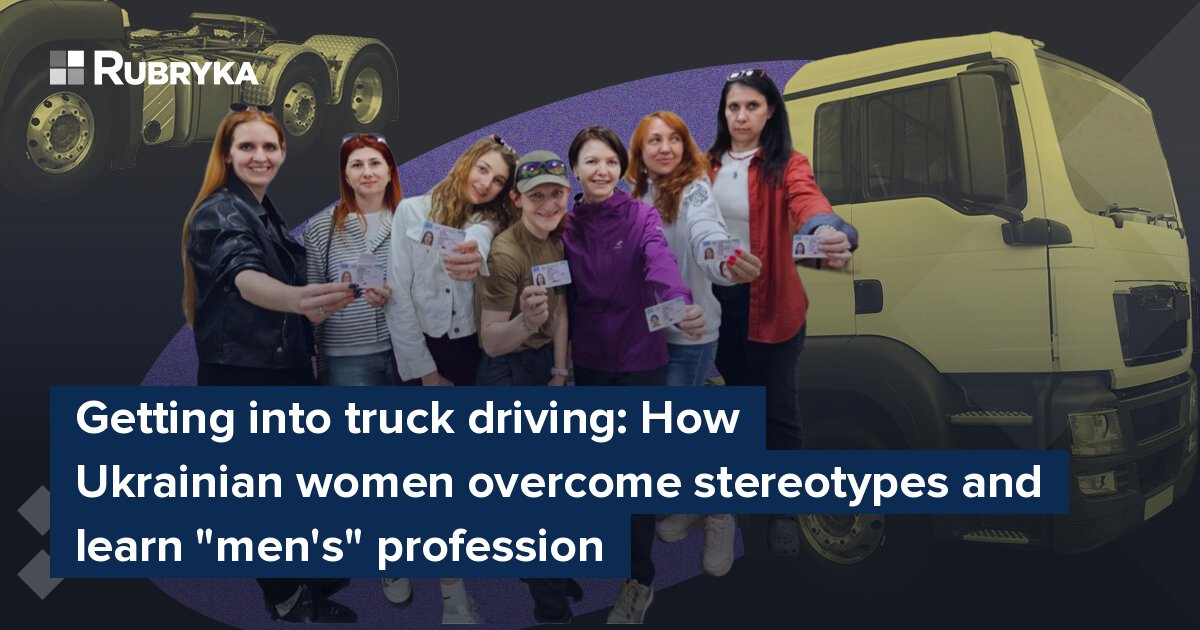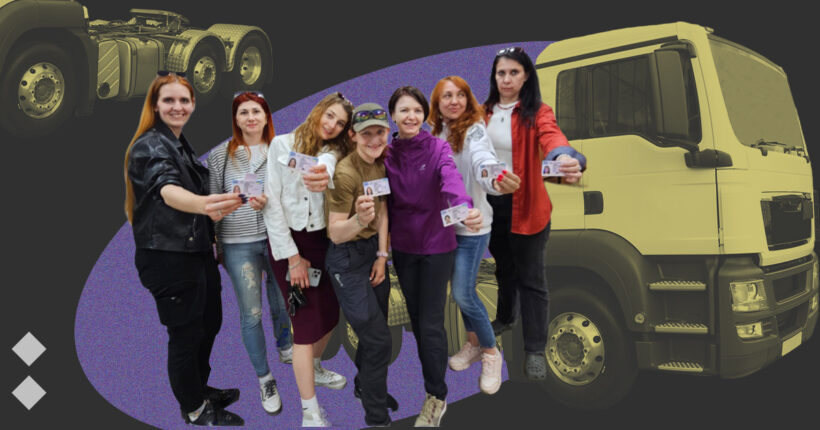
What's the problem?
"We need to rebuild and restore Ukraine today"—these words sounded in Stockholm in the fall of 2023. The need to support the country, which has been blighted by Russia's full-scale war since 2022, toward recovery inspired the idea for the first Swedish project, Reskilling Ukraine. The project's goal is to help rebuild Ukraine through educational programs that provide new skills and qualifications to meet the current challenges and needs of society during and after the war.
"We conducted a detailed study of various fields and found that the demand for truck drivers and bus drivers is increasing daily in Ukraine," says Oleksandra Panasiuk, the program coordinator for Reskilling Ukraine. "Many men will defend the country, including those who work as drivers of large vehicles. Both private and public enterprises are feeling the shortage of drivers. Truck drivers are essential for maintaining critical infrastructure and business operations."
The project's team also noticed more women are unemployed than men—statistics show that about 70% of the unemployed in Ukraine are women.
What's the solution?
The Reskilling Ukraine decided to give Ukrainian women the opportunity to retrain, learn a new profession, find employment, earn money, and contribute to the country. The Reskilling Ukraine driving course for women is a free training program that allows women to become truck drivers and also learn to drive passenger buses. The Swedish non-profit organization Beredskapslyftet implements the project in partnership with Scania Ukraine. Scania had previously run a similar program to train women in Argentina, so their experience was very helpful.
How does it work?
What's it like to become a woman truck driver in Ukraine?
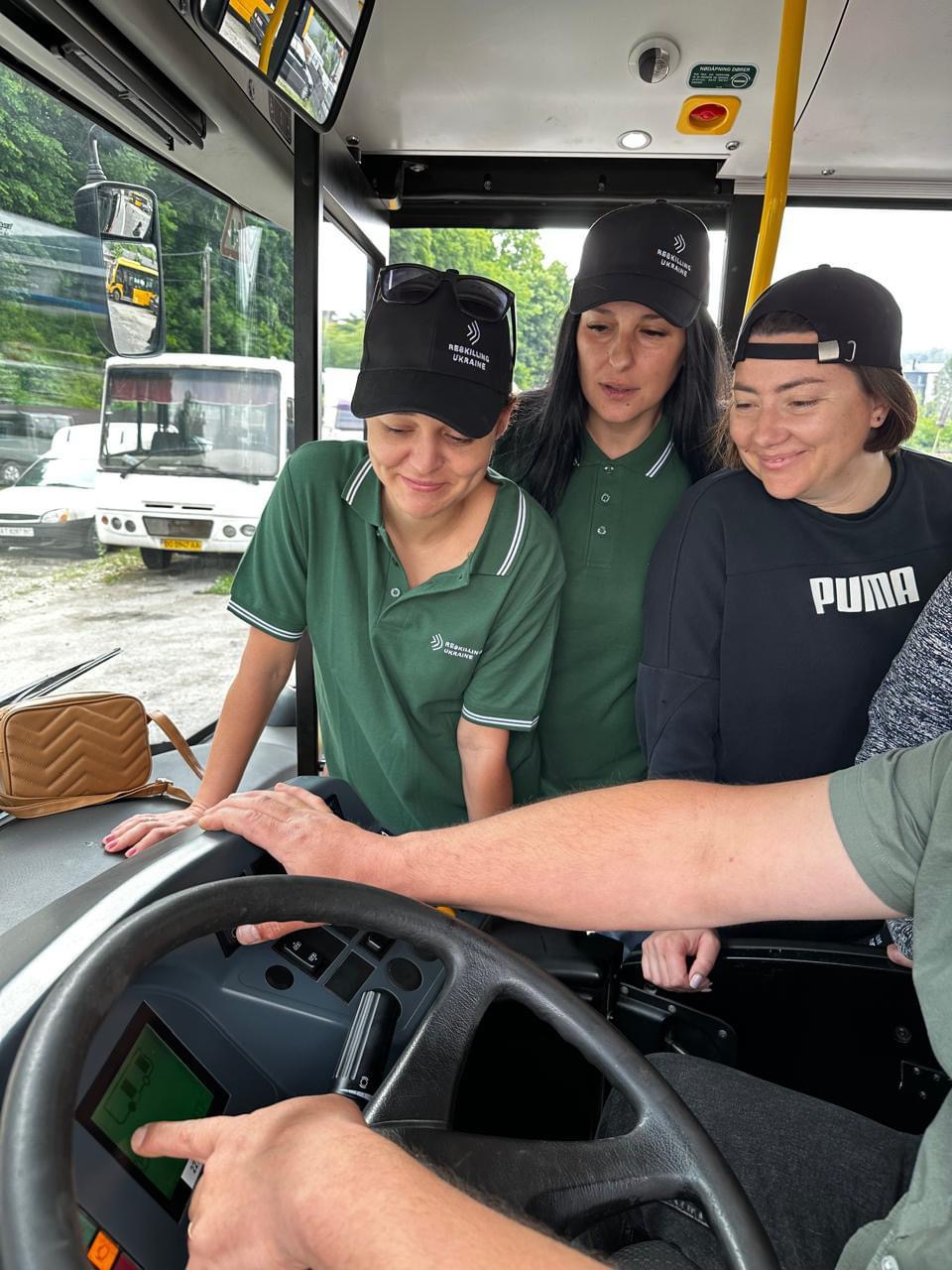
Theoretical classes in the OnTrack retraining course for women. Photo from Reskilling Ukraine's archive
As part of the project, Ukrainian women can take free theoretical and practical driving lessons to pass the test for a category C and D driver's license. Training takes place in the Kyiv and Ternopil regions.
Overall, the project offers two training programs:
- OnTrack: Retraining program for truck drivers (for trucks weighing more than 7.5 tons)
- BusDrive: Retraining program for bus drivers
The courses include both theoretical and practical parts. The theoretical part is conducted online, and the practical part takes place in the Ukrainian capital, Kyiv, or the western city of Ternopil. During training, the organizers also cover the costs of hotel accommodation, meals, and transportation to the training locations.
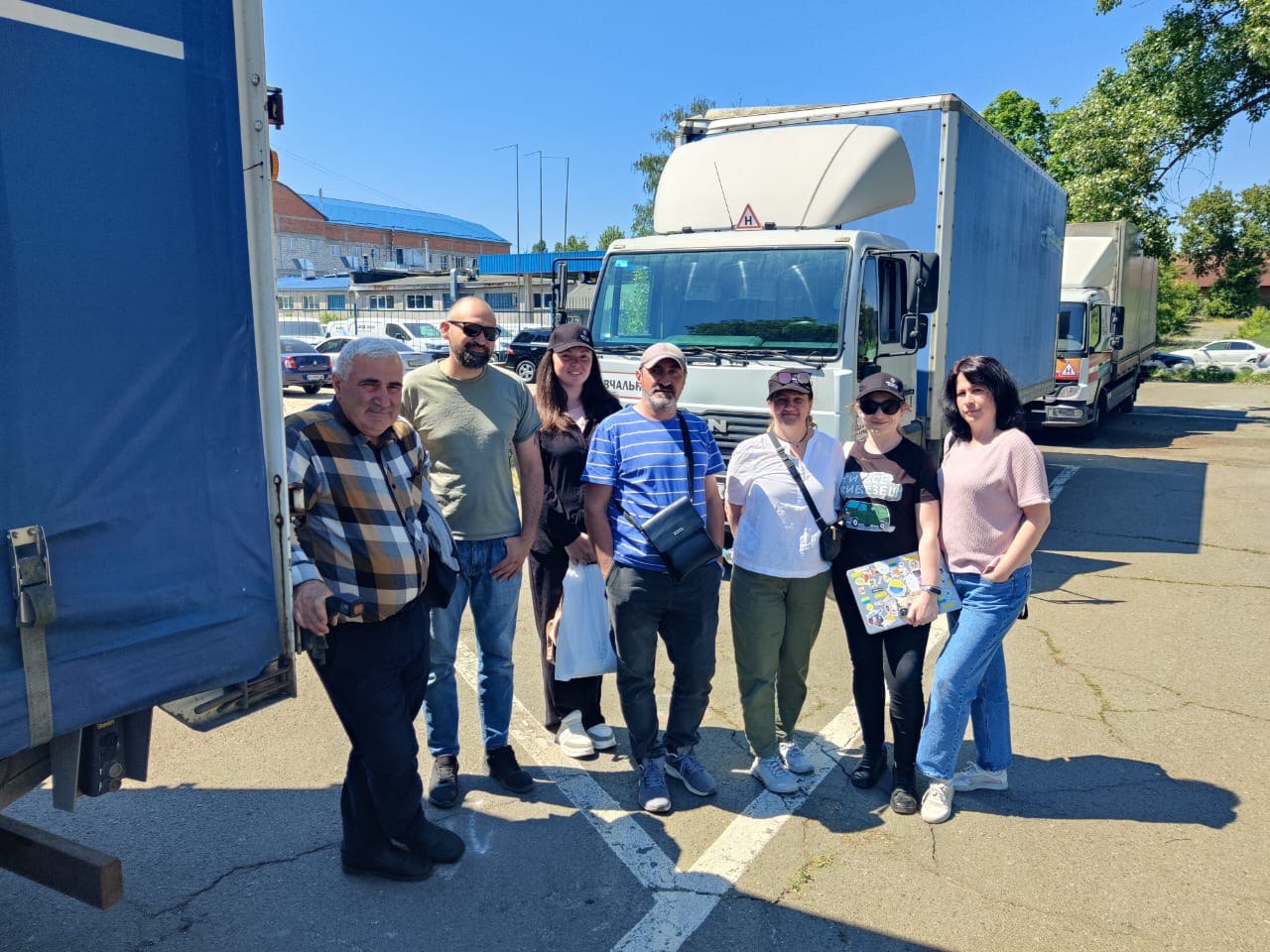
Trainees with the project's instructors. Photo from Anna Yashna's archive
Candidate requirements are a category B driver's license, at least three years of driving experience, and passing a short test with ten questions on traffic rules.
"We have priority groups of women we work with. We pay special attention to internally displaced women and those who have soldiers, veterans, or deceased defenders in their families. Women over 50 are also a priority group," says Viktoria Posieva, the Reskilling Ukraine communications manager. "We are happy to work with female veterans, former soldiers, and single mothers. These are the groups of women who need additional support. However, the most important factor for us in choosing participants is the motivation to change their profession and start working as a bus or truck driver. Any woman in Ukraine can become our participant."
"The most important thing is that we can help women retrain and start working in transportation. We are all united by the desire to help as many women as possible discover the new driver profession," says Oleksandra Panasiuk. She organizes the training to ensure every participant has the best possible experience in the project.
Does it really work?
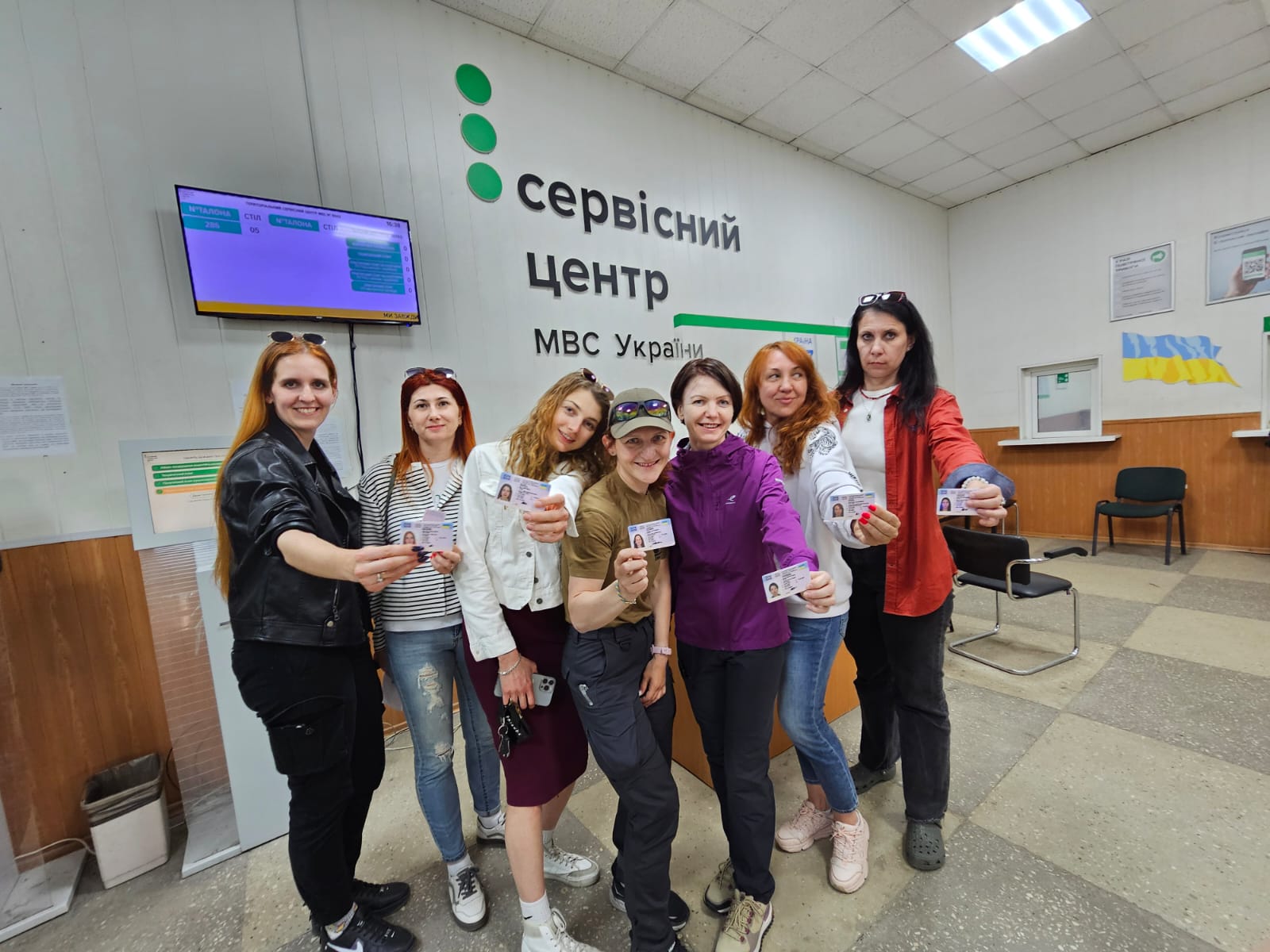
Project participants receive a Category C license. Photo from the Reskilling Ukraine archive
Since the project began, Ukrainian women have submitted 210 applications for the BusDrive course and more than 1,000 for the OnTrack course (truck driving).
Viktoria Posieva explains that women have many reasons for becoming truck drivers: some want to help the country, and others want to change careers and start a new professional path. The project also includes women who, for various reasons, cannot return to their previous jobs. The initiative helps them learn a new profession and provides career and mentoring support after they complete the training and get a new driver's license.
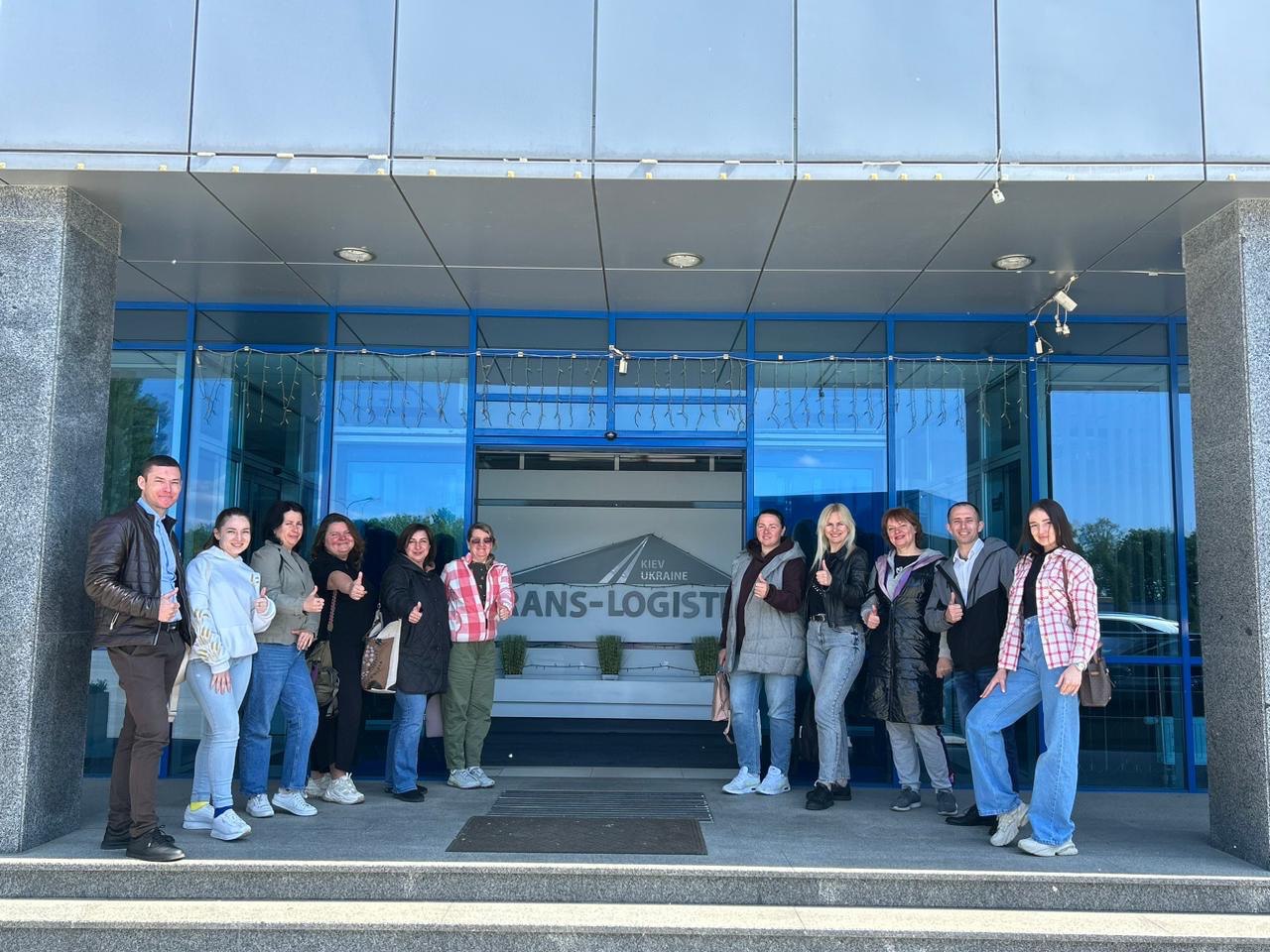
Trainees touring the office of the transportation company Trans Logistics in Kyiv. Photo from Anna Yashna's archive
In addition to driving, participants undergo pre-hospital aid training so they can save lives in case of an accident. They also visit logistics centers and companies like OKKO, Fozzy Group, Trans Logistics, Havi, etc. During these tours, the drivers learn about the inner workings of large enterprises and their career development opportunities.
Motivation, opportunities, and equal rights
Anna Yashna is a graduate of the OnTrack course. She is an environmental engineer by education and an accountant by profession. Since the start of the war, she has been actively involved in volunteer work, including transporting vehicles to and from the combat zone for repairs. Anna says she has been thinking about getting a truck driving license for a long time.
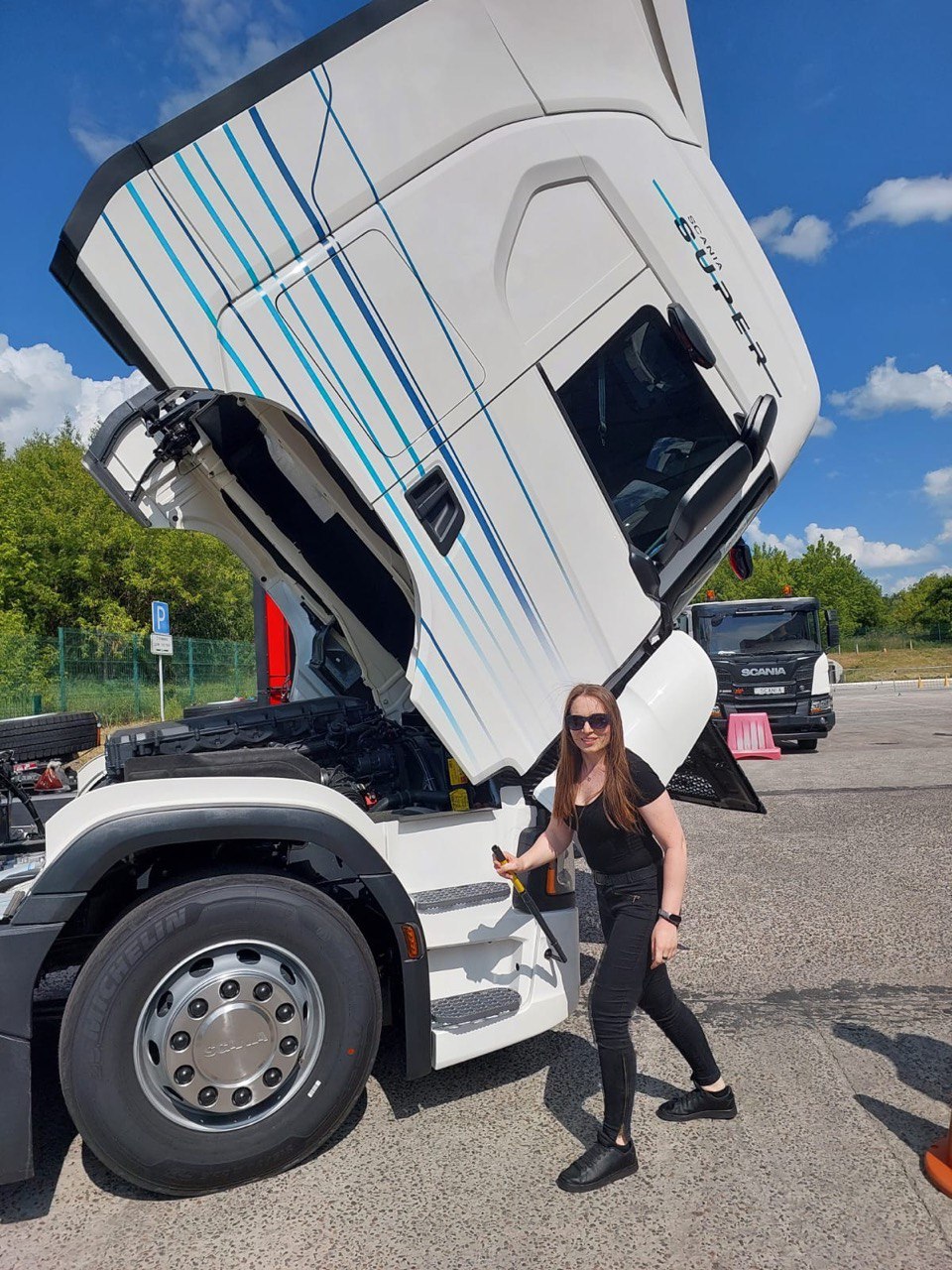
Anna Yashna learning to raise the truck cabin. Photo from Anna Yashna's archive
"I feel most comfortable behind the wheel," says Anna Yashna. "However, the reactions from others and their prejudices varied — from 'Why do you need this?' to 'This is not a woman's job.' But this did not stop me because I remember the times when I was learning to drive a car. Back then, people also looked at girls behind the wheel with suspicion, but times have changed, and now, no one is surprised to see a girl driving. I'm sure that soon, women truck drivers will not be a surprising phenomenon either, especially since it is already common in some countries. Given the war in our country, this is also a necessary decision."
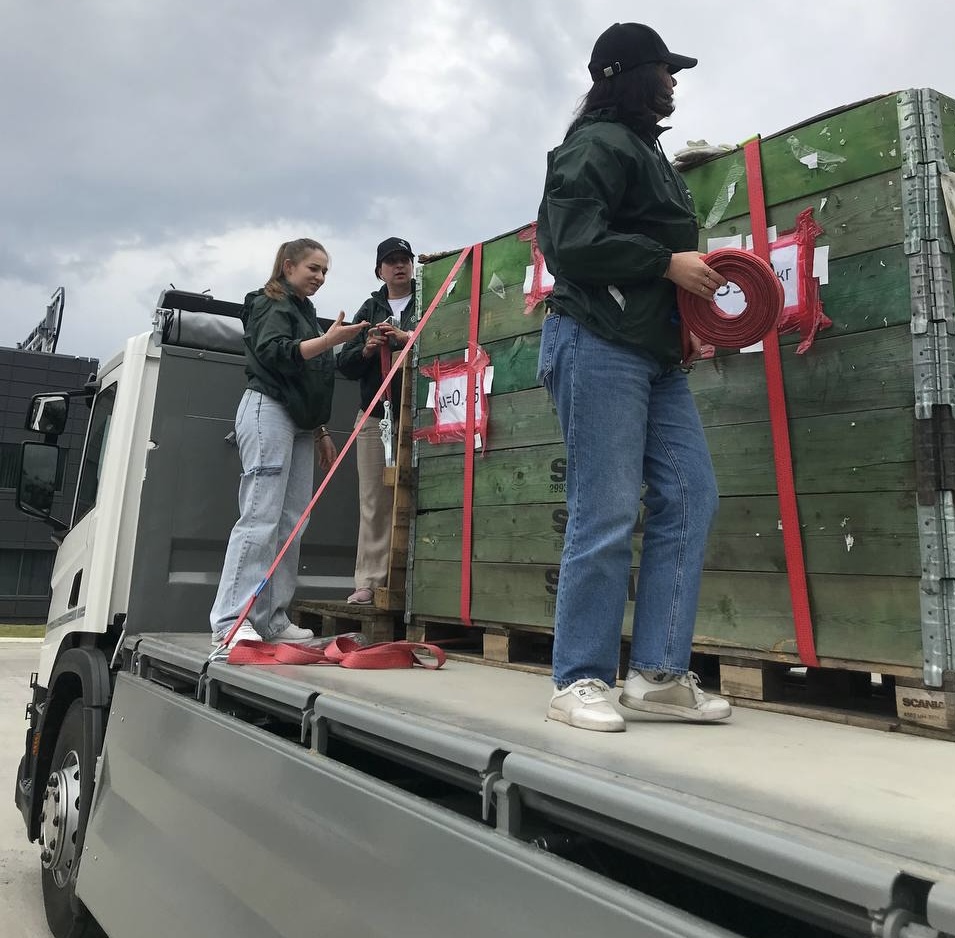
Securing cargo. Photo from Anna Yashna's archive
Anna explains that truck driving is not easy because it requires more than just driving skills. For example, to lift a heavy truck cabin, you need to use your hands: "I thought it was done with just a button," Anna laughs. Securing cargo is also challenging—it requires knowledge of physics, strength, and endurance. But according to Anna, Ukrainian women can handle anything.
"Our driving instructors say that women are more responsible and easier to teach," says Anna Yashna. "With determination and desire, we can overcome obstacles and professional barriers and become the best in our field."
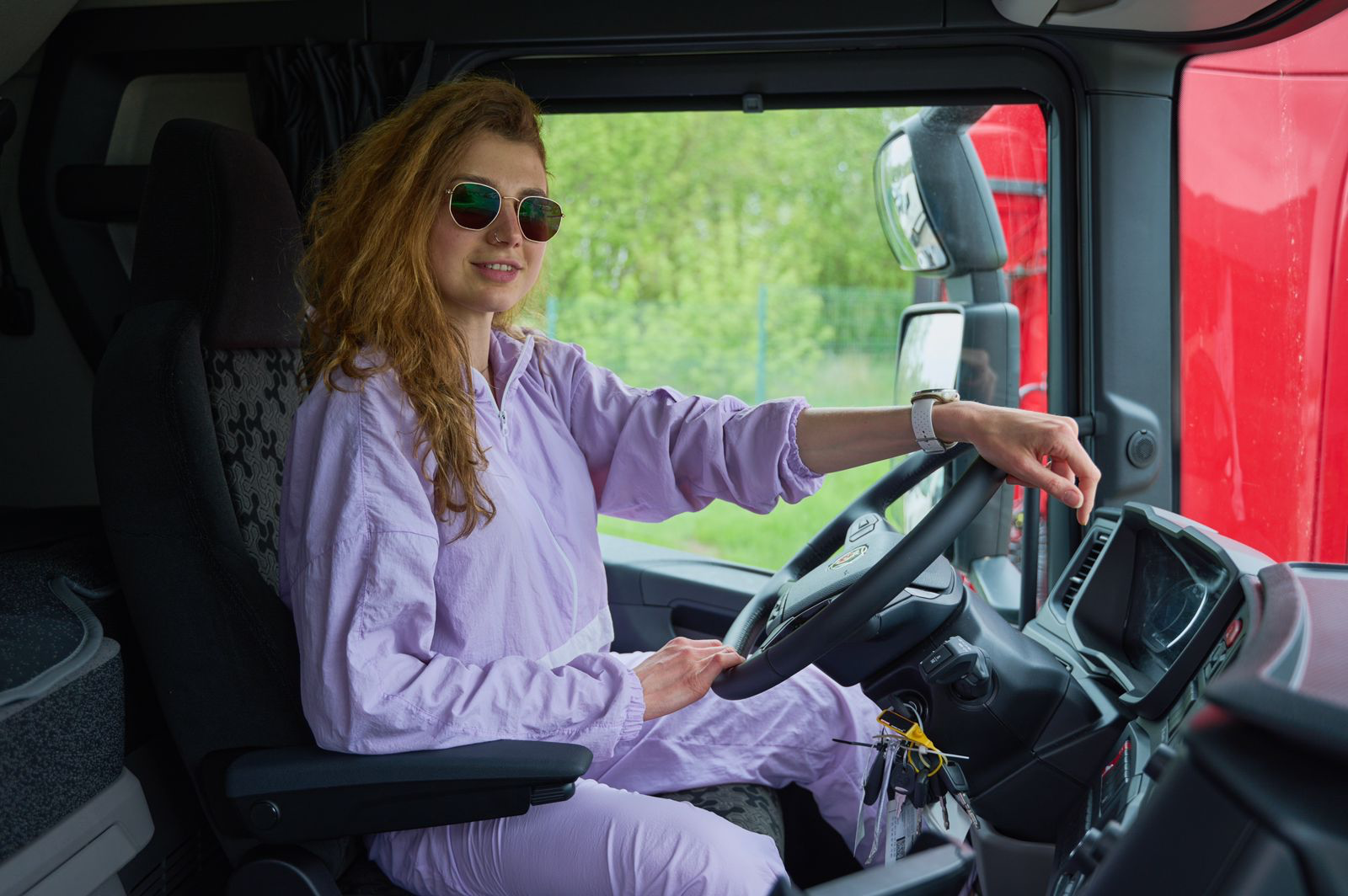
Yana Zakhozha behind the wheel of a Scania truck. Photo from Yana's archive
Yana Zakhozha is a nutritionist by profession. She does not plan to leave her profession altogether but intends to combine it with truck driving. Yana learned the basics of driving as a teenager.
"My dad is a very skilled driver, a long-distance trucker with vast experience, skills, and knowledge. I got my strong foundation from him. Later, we traveled across Ukraine together; I would ask to join him on trips and sit beside him," Yana shares. During the war, she also transported vehicles for the Ukrainian Armed Forces from abroad and eventually found herself needing a higher driving license category.
Yana Zakhozha believes that gender does not matter when it comes to driving a truck. She was convinced of this during the project, where she met women with more experience than some men.
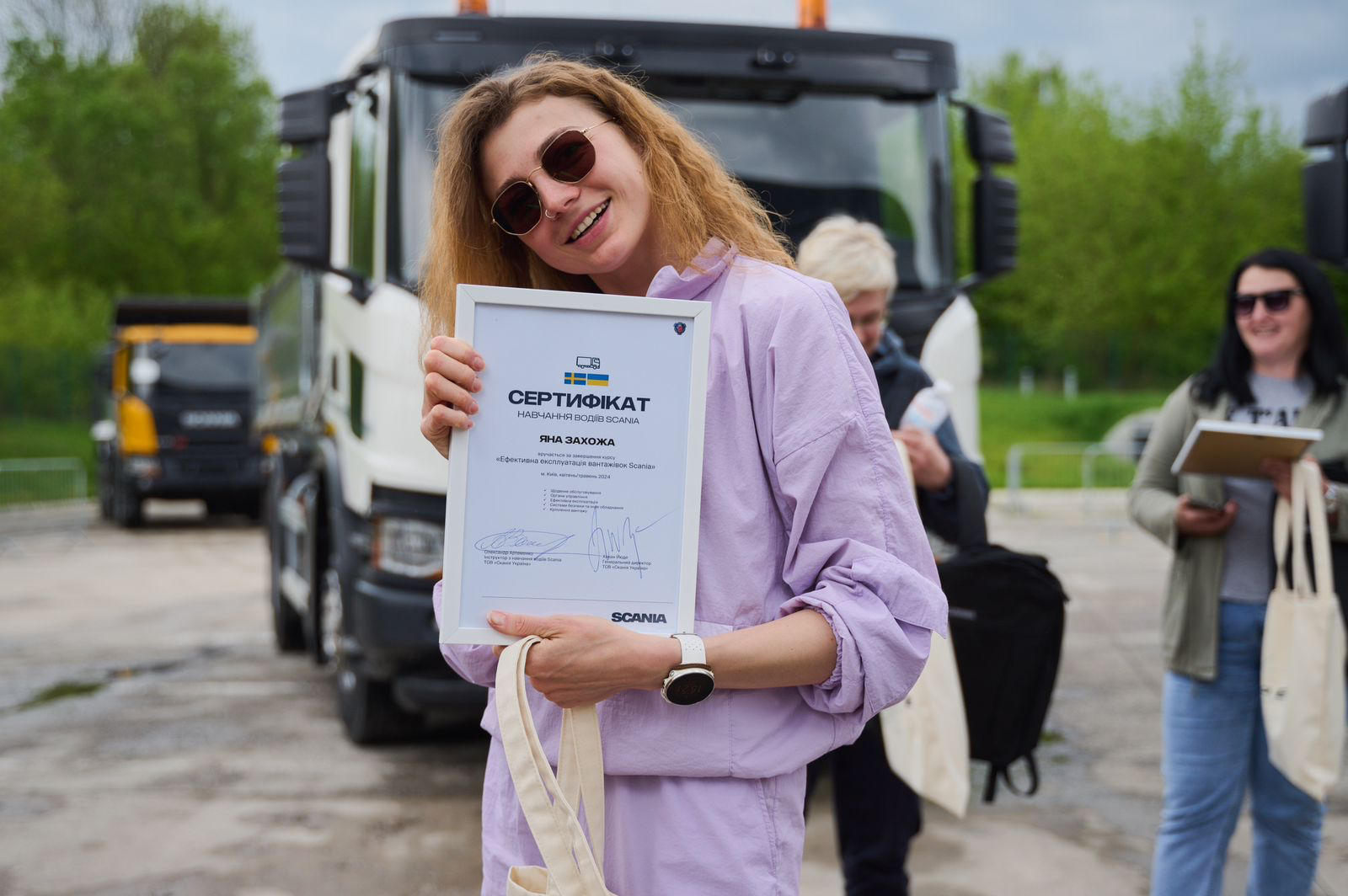
Yana Zakhozha with her certificate. Photo from Yana's archive
"I think the idea of 'male' and 'female' professions is a prejudice from the past. There is a profession, and there are people who can or know how to or want to do it. For comparison, some men work in the beauty industry. So, necessity or desire is relative. I follow girls and women who have been long-distance truckers for a while. It's very cool! They succeed in everything!" says Yana Zakhoja.
Yana plans to continue; soon, she wants to get a category CE license (for a truck with a trailer) to have even more opportunities.
"Truck driving can be combined with taking care of children and spending time with family. It is just another opportunity that has opened up for women due to the processes happening in Ukraine," Viktoria Posieva, the project's communications manager, comments. "European countries have already gone through this path, and we know it is possible to freely choose professions 'to your liking' regardless of gender, place of residence, or previous experience."
In her view, the project aims not only to train and retrain women but also to contribute to educational efforts in society to reduce gender imbalance in certain professional fields.
Are employers ready to see women driving trucks?
"We have a high demand from employers for female truck drivers. Many of them are ready to hire the project's graduates right now," says Viktoria Posieva. Employers understand that this is not just a business issue but also a matter of maintaining critical infrastructure and the economy of Ukraine.
Viktoria notes that the audience and Ukrainians' reactions to the project's launch have been mostly positive. Society is ready for changes and understands the importance of the issue.
"We have contacts with major employers creating adaptation programs for women entering the profession. This includes a new onboarding process, adjusting work schedules, and the time women drivers work," says Viktoria Posieva. "They are also willing to pay for additional training for drivers to get other licenses, offer paid internships, and provide full workplace adaptation programs. They are creating new changing rooms and automating various processes at their facilities so women can work comfortably and without health risks."
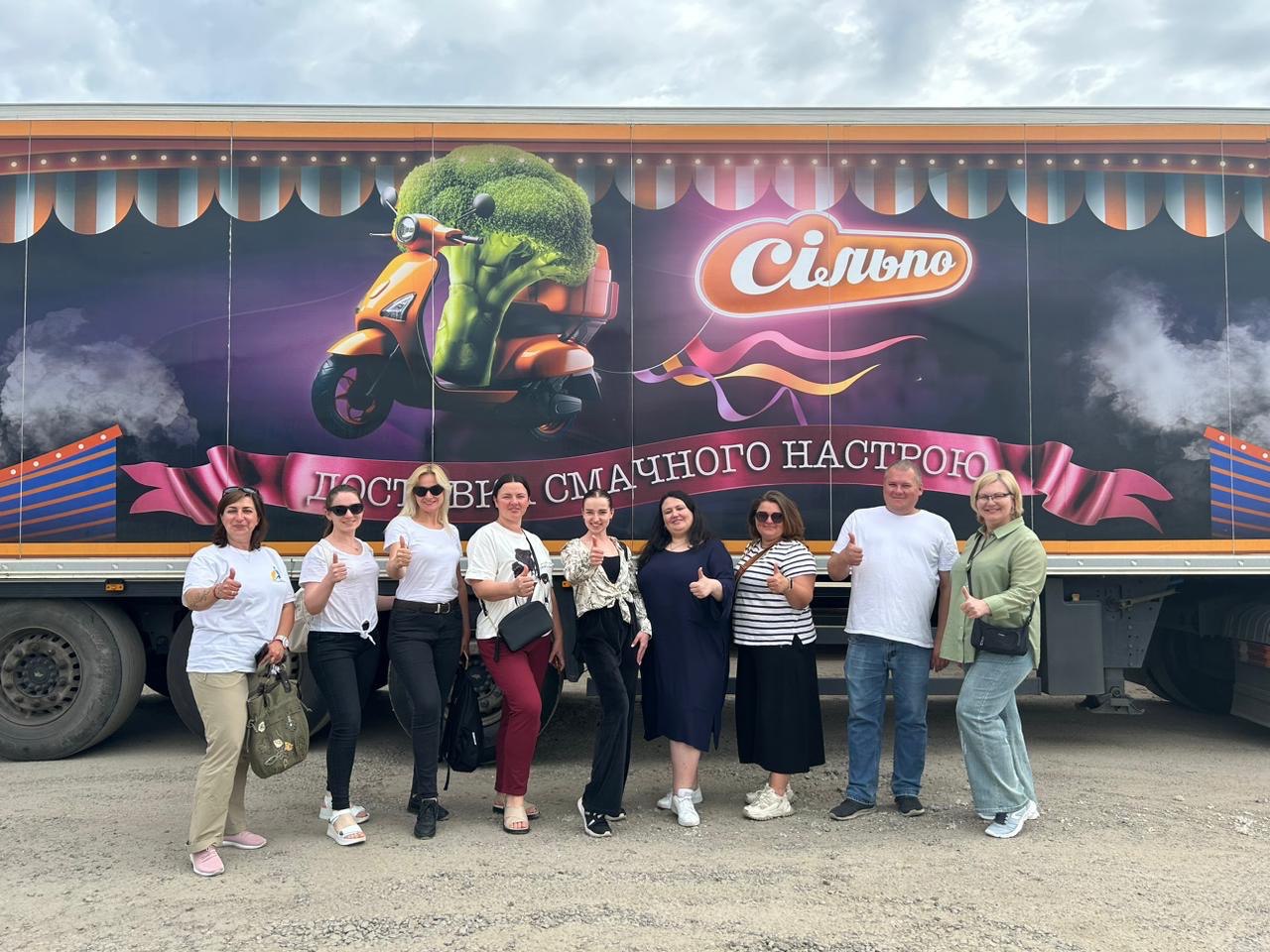
OnTrack course participants touring the facility of Fozzy Group. Photo from Anna Yashna's archive
One company that already employs women drivers is Fozzy Group, one of Ukraine's largest trade industrial groups. Two women joined the company a few months ago. They used to be taxi and trolleybus drivers, but now they drive 10-ton Scania trucks.
"Reskilling Ukraine is a significant project. First, it helps Ukrainian businesses and our society overcome the human capital crisis. The program allows women to retrain for in-demand professions or acquire new ones," Liubov Ukrainets, HR Director of Silpo, the Fozzy Group supermarket chain, comments. "Second, it is a great collaboration for us. We share our experiences with the program participants, organize open house days, and introduce them to our company. As a result, the women know they have a potential workplace with good conditions if they start a driving career after training."
According to Liubov, the company is already in touch with all the OnTrack course participants and will be happy to see them join after graduation.
What stops women from becoming truck or bus drivers?
Fear of the unknown and, judgment from others, and misunderstanding why someone would choose to drive a bus or truck are significant issues. Another problem is that truck driving includes loading and unloading work.
"This depends on the employer. Some companies separate these roles, but others still combine them. Not everyone can handle the heavy lifting. It's not just about being a man or a woman; it's about physical capabilities," the project representatives explain.
How many women have completed the courses, and when can others join?
So far, 66 women have completed the training — four groups of graduates in Kyiv and one in Ternopil — and over 100 are enrolled in summer groups. In early June, Ternopil's first bus driver training group started practical lessons.
The project plans to retrain 300 women as bus and truck drivers by the end of the year. Organizers hope to continue and expand the project into 2025.
"Each of our graduates is a brave, smart, and determined woman exploring a new profession despite everything. We are proud of them, and they are our greatest motivation to keep working and doing more for them and Ukraine," the representatives of Reskilling Ukraine say.
Currently, the project invites women to the retraining program "BusDrive — Passenger Bus Driver." This free program includes an online theoretical part and practical training in the Ternopil region. The next course starts on July 1.


